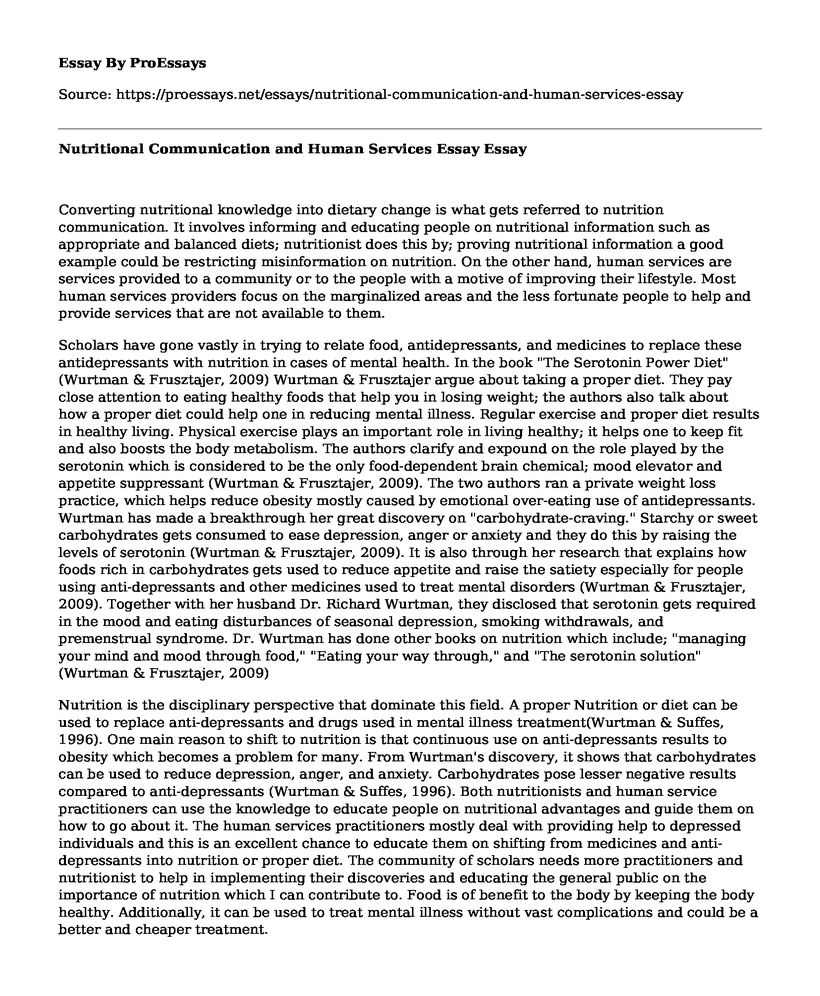Converting nutritional knowledge into dietary change is what gets referred to nutrition communication. It involves informing and educating people on nutritional information such as appropriate and balanced diets; nutritionist does this by; proving nutritional information a good example could be restricting misinformation on nutrition. On the other hand, human services are services provided to a community or to the people with a motive of improving their lifestyle. Most human services providers focus on the marginalized areas and the less fortunate people to help and provide services that are not available to them.
Scholars have gone vastly in trying to relate food, antidepressants, and medicines to replace these antidepressants with nutrition in cases of mental health. In the book "The Serotonin Power Diet" (Wurtman & Frusztajer, 2009) Wurtman & Frusztajer argue about taking a proper diet. They pay close attention to eating healthy foods that help you in losing weight; the authors also talk about how a proper diet could help one in reducing mental illness. Regular exercise and proper diet results in healthy living. Physical exercise plays an important role in living healthy; it helps one to keep fit and also boosts the body metabolism. The authors clarify and expound on the role played by the serotonin which is considered to be the only food-dependent brain chemical; mood elevator and appetite suppressant (Wurtman & Frusztajer, 2009). The two authors ran a private weight loss practice, which helps reduce obesity mostly caused by emotional over-eating use of antidepressants. Wurtman has made a breakthrough her great discovery on "carbohydrate-craving." Starchy or sweet carbohydrates gets consumed to ease depression, anger or anxiety and they do this by raising the levels of serotonin (Wurtman & Frusztajer, 2009). It is also through her research that explains how foods rich in carbohydrates gets used to reduce appetite and raise the satiety especially for people using anti-depressants and other medicines used to treat mental disorders (Wurtman & Frusztajer, 2009). Together with her husband Dr. Richard Wurtman, they disclosed that serotonin gets required in the mood and eating disturbances of seasonal depression, smoking withdrawals, and premenstrual syndrome. Dr. Wurtman has done other books on nutrition which include; "managing your mind and mood through food," "Eating your way through," and "The serotonin solution" (Wurtman & Frusztajer, 2009)
Nutrition is the disciplinary perspective that dominate this field. A proper Nutrition or diet can be used to replace anti-depressants and drugs used in mental illness treatment(Wurtman & Suffes, 1996). One main reason to shift to nutrition is that continuous use on anti-depressants results to obesity which becomes a problem for many. From Wurtman's discovery, it shows that carbohydrates can be used to reduce depression, anger, and anxiety. Carbohydrates pose lesser negative results compared to anti-depressants (Wurtman & Suffes, 1996). Both nutritionists and human service practitioners can use the knowledge to educate people on nutritional advantages and guide them on how to go about it. The human services practitioners mostly deal with providing help to depressed individuals and this is an excellent chance to educate them on shifting from medicines and anti-depressants into nutrition or proper diet. The community of scholars needs more practitioners and nutritionist to help in implementing their discoveries and educating the general public on the importance of nutrition which I can contribute to. Food is of benefit to the body by keeping the body healthy. Additionally, it can be used to treat mental illness without vast complications and could be a better and cheaper treatment.
Works Cited
Wurtman, J., & Frusztajer, N. T. (2009). The Serotonin Power Diet: Eat Carbs--Nature's Own Appetite Suppressant--to Stop Emotional Overeating and Halt Antidepressant-Associated Weight Gain. Rodale.
Wurtman, J. J., & Suffes, S. (1996). The serotonin solution. New York, NY: Fawcett Columbine.
Monette, D., Sullivan, T., & DeJong, C. (2013). Applied social research: A tool for the human services. Nelson Education.
Kant, A. K., & Graubard, B. I. (2004). Eating out in America, 1987-2000: trends and nutritional correlates. Preventive medicine, 38(2), 243-249.
Cite this page
Nutritional Communication and Human Services Essay. (2022, Sep 22). Retrieved from https://proessays.net/essays/nutritional-communication-and-human-services-essay
If you are the original author of this essay and no longer wish to have it published on the ProEssays website, please click below to request its removal:
- Research Paper on Obesity in Canada
- Essay Sample on Vascular Haemostasis
- Changing Community Understanding of Child Sexual Violence Paper Example
- Essay Sample on The Non-Consequentialist Ethical Theory and Abortion
- Randy's Case: Schizophrenia Case Study Analysis
- Nurses' Malpractice: Increase in Defendents & Professional Conduct - Research Paper
- Essay Example on Study of Human Brain: Genes, Mental Disorders, & Behaviors







